Operation Brock is set to return to the M20 this summer to help keep Kent moving and open for business ahead of an extremely busy period for cross channel traffic.
Peak passenger numbers are expected to head through Kent to Europe this year, as they head off on holiday or to enjoy the Olympic Games in Paris.
As part of the plans to control traffic effectively, and to minimise the impact of disruption on the roads in communities in and around Dover and Folkestone, a new permit system will come into force in the Operation Brock queue for freight.

The Kent & Medway Resilience Forum (KMRF) is urging people to plan ahead if they are travelling through the county during the peak summer months, including booking ahead and preparing for any queues.
With extremely busy travel weekends predicted from the 13 July right through to the middle of August, the contraflow at the heart of the Brock traffic management scheme will be reinstated on the M20 overnight on Wednesday 10 July.
The permits are aimed at preventing freight drivers from ‘rat running’ as they head through Kent to cross the channel and try to dodge the queues in Operation Brock.
Preventing lorries from bypassing the control measures put in place by the KMRF would help reduce congestion in Dover and surrounding areas when the roads to the Port of Dover and Eurotunnel are congested.
It’s also hoped the new permit system will reduce the need for sudden closures of the A20 Roundhill Tunnels at Folkestone and help keep local roads flowing more freely in busy periods.

“We are doing everything we can to find more effective ways to manage traffic heading through Kent to cross the channel” Simon Jones Strategic Lead of the KMRF
Strategic Lead of the KMRF, Simon Jones, said
“We are doing everything we can to find more effective ways to manage traffic heading through Kent to cross the channel, as we know that the impact of severe disruption on local communities and in Dover itself can really affect people’s lives and businesses.
“One thing that could help is stepping up measures to ensure that freight drivers stick to the plan, and cannot circumnavigate the queues. This only adds to congestion, particularly in the centre of Dover.
“However, these freight permits are not a ‘fix all’ solution. There is no doubt that, in busy periods, the situation on the roads heading through Dover remains extremely fragile. With a busy summer ahead, and the introduction of EES checks later this year, we are doing everything we can to prevent further disruption.”
As part of the new measures, permits would be issued to Port of Dover bound freight drivers at the front of the Operation Brock queue.
To ensure freight drivers have followed the correct route, all freight heading to the Port of Dover would have to leave the A20 at the Courtwood Interchange, at the junction of the A20 and the B2011, where their permits would be checked at the end of the slip road. If they have complied, they will be allowed to re-enter the TAP queue on the A20 and continue their onward journey to the port.
The message from KMRF to freight drivers is ‘No permit – No Access to Port of Dover.’
Local HGVs and deliveries will not be pulled off the A20, but allowed to continue their journey, with passenger and local traffic, onwards into Dover. Those Kent hauliers that qualify for a Local Haulier Permit will be sent this ahead of the busy summer period. There is no need to apply for a local licence as, if you fall within the catchment area, KMRF already has your details.
Traffic flows will be continually monitored throughout the holiday period and Operation Brock will be removed as soon as possible, once the impact of disruption has reduced.
